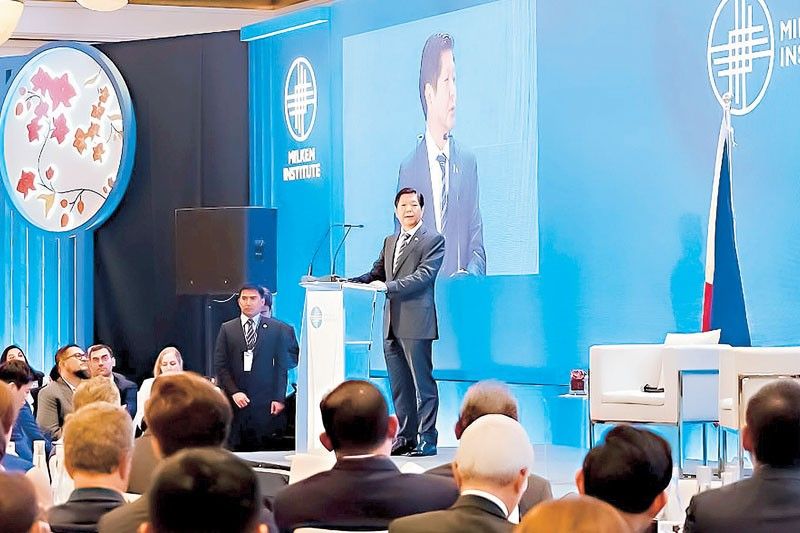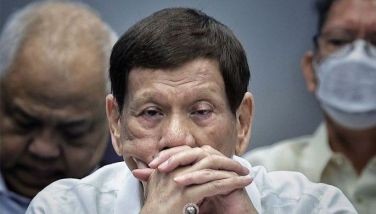President Marcos: Reliance on rice imports not a wise choice

MANILA, Philippines — Relying on importation to augment the supply of rice and other food commodities is not a “wise choice,” President Marcos said, as he emphasized the importance of developing the country’s agriculture sector to ensure that food remains sufficient and accessible to every Filipino.
“This is a lesson that we immediately learn. I said, we cannot now continue to depend on importation, which is what has happened for the Philippines. In the past years, it became the easy way out. Just import more, import more rice, import more corn, import more everything,” Marcos said during the 2023 Asia Summit in Singapore last Wednesday.
“And the pandemic showed us that this was not a wise choice to have made and so we have continued to develop our agricultural sector and the aspiration once again is that we are able to provide sufficient supply of food at prices that people can afford,” he added.
Marcos admitted that the Philippines is “not there yet” in terms of achieving its food supply goal but has made “many important” steps toward it.
“We are trying to put the value chain, especially of agriculture, we are trying to put that value chain together, all the way from R&D (research and development), all the way to retail, to the market,” the President said.
“There are bits and pieces of it that already exist but they do not work as one system and that’s what we are trying to achieve and we are slowly making inroads into that problem.”
The United States Department of Agriculture has reported that the Philippines has overtaken China as the world’s top rice importer. It noted that in 2008, the country began to buy larger volumes of the commodity as prices rose. According to the USDA, the Philippines is delaying purchases this year as it waits for prices to drop.
Rice prices worldwide have climbed to their highest levels in 15 years following the latest export ban policy of India, which supplies about 40 percent of the global rice trade, the US agriculture agency said. The Philippines has imported 2.33 million metric tons of rice as of Sept. 7, according to data from the Bureau of Plant Industry.
Because of escalating rice prices, Marcos signed Executive Order No. 39, which imposed price caps on regular milled and well-milled rice. The price ceilings, which took effect last Sept. 5, seek to ensure that rice remains affordable to ordinary Filipinos. Under the order, the mandated price cap on regular milled rice is P41 per kilogram while the price ceiling on well-milled rice is P45 per kilogram.
The Marcos administration has also started providing cash aid to small rice retailers affected by the price ceilings.
‘Bright future’
At a roundtable discussion with Singaporean businessmen also last Wednesday, Marcos predicted a “bright” future for the Philippines and Singapore, noting that their ties started at the people-to-people level.
“In that time between the very beginning of that relationship, we haven’t come across really any significant issues, diplomatic, political or otherwise between Singapore and the Philippines,” Marcos said.
“And I think that is the reason why, at some point, Singapore was the largest source for foreign investment in the Philippines,” he added.
“So for me, the future is bright for the Philippines and Singapore. And I see more opportunities than we have ever had before in fact, and it’s just up to us to identify those and to agree on how to best respond to the changes that we now face,” he said.
Marcos noted that the Philippines’ exports to Singapore rose by 16.98 percent to $4.91 billion last year from $4.2 billion in 2021. Singapore was also the Philippines’ largest source of foreign direct investments in 2021 with a net investment of $761 million, according to a Malacañang statement.
Marcos also assured Singaporean businessmen that Maharlika, the Philippines’ sovereign wealth fund, would be handled by professional fund managers, not by politicians.
“It is not run by the government. It is run by professional fund managers and that is one of the main assurances that I had to give. Because when the politicians get involved, then the decisions are no longer purely financial in nature and that causes failure, I think. And it doesn’t make it an efficient management of the fund,” Marcos said.
“So, those are the ways that we see. This will go into infrastructure, into power development. Again, those main elements are health care – all of the areas that we have identified as priorities,” he added.
Created through Republic Act 11954, the Maharlika Investment Fund was intended to become a vehicle to make profitable and strategic investments in vital sectors. The law also seeks to fast-track the implementation of key infrastructure projects and to support efforts to attain the Philippines’ economic targets.
Marcos also called on businesses in Singapore to consider the Philippines as their investment hub for renewable energy. He noted that foreign investors in the Philippines can now enjoy 100 percent equity in the exploration, development and use of solar, wind, hydro and ocean or tidal energy resources.
“The policy change comes as the Philippines seeks to attract foreign investments to boost the renewable energy sector and to meet our long-term climate targets,” the President said.
“With this development, I encourage our Singapore partners to consider the Philippines and take part in the country’s goal of increasing renewable share in power generation and offering lower cost and cleaner energy to the general public,” he added.
Build, build, more
Marcos likewise asked Singaporean businesses to participate in infrastructure projects under the “Build, Better, More” program.
“There are numerous projects that can be explored in the areas of physical and digital connectivity, water resources, agriculture, health, and energy,” he said.
“So, to our partners in Singapore, I offer you the assurance of our greatest efforts in supporting businesses as we work together in achieving our economic agenda and making the Philippines your destination of choice for investment.” — Delon Porcalla
- Latest
- Trending
































